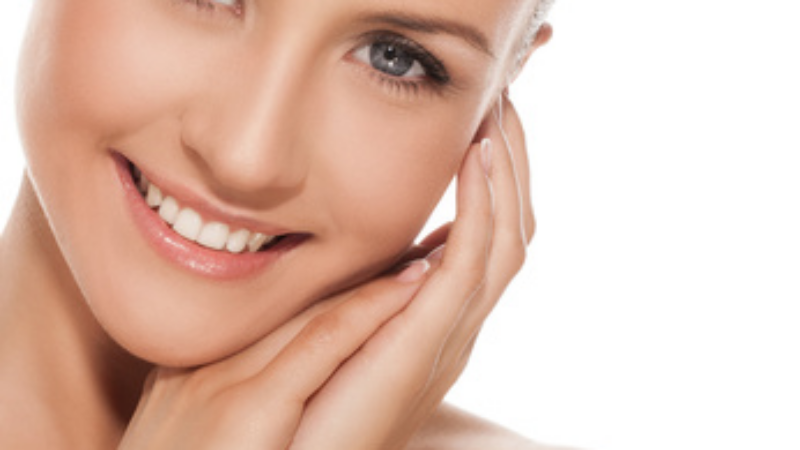If you have sensitive skin, chances are you’re not alone. Statistics show that more than 50% of individuals claim to have sensitive skin. One generally isn’t born with sensitive skin; it tends to develop over time.
If your skin is sensitive, you may experience excessive dryness, stinging, burning, redness and tightness. Chances are that your skin reacts to certain skin care products or cosmetics and you may not always be sure why. Even if you manage to identify the offending ingredient(s), your skin may be left with pustules, skin bumps, redness and irritation for days or even weeks afterwards. You may not be able to tolerate products that worked before leaving you feeling frustrated and helpless.
What Causes Sensitive Skin?
Sensitive skin can be genetic, but most people develop the sensitivity as a result of a damaged skin barrier due to environmental or lifestyle factors. Skin is left unable to protect as one of its main functions. Most likely, skin will have a thinner strateum corneum (skin’s outermost covering), a weaker lipid (fat) barrier and possibly more hair follicles and sweat glands. These result in skin that absorbs external ingredients more readily and that gives up moisture more easily. Rosacea is a skin condition that is associated with sensitive skin.
A damaged skin barrier may stem from:
- A breakdown of collagen (the skin’s supporting network)
- Harsh treatments including irritating skin care products, abrasive treatments (including some harsh scrubs, loofahs or washcloths)
- Cold or hot water and
- Oil stripping soaps and cleansers
As well, unprotected sun exposure over time can lead to sensitive skin. Lastly, the hormonal changes that many women experience at perimenopause and/or menopause may result in a decrease in natural secretions and a thinner protective fat layer which can contribute to sensitive skin. If this is the case, you may need to re-evaluate your skin care routine and switch up your products to find ones that skin now tolerates.
Taking Care of Sensitive Skin
The key to nurturing sensitive skin is to be gentle with it. Calming ingredients such as seaweed, olive oil, green and white teas may be beneficial. Antioxidants such as Vitamins C, E and green tea can help to prevent the free-radical damage that triggers sensitivity. Essential fatty acids, gamma linoleic acid and hyaluronic acid can provide the raw materials needed by skin cells to help repair a damaged skin barrier. Moisture is key in that it not only helps to create a proper lipid barrier, but also delivers much needed moisture to the skin.
Toss products that contain ingredients that will irritate skin. Products containing fragrances may be particularly problematic; some facial cleansers and soaps can be drying and irritating.While not a full list, here are some ingredients that can irritate skin commonly found in skin care products:
- Alcohols – isopropyl alcohol or SD alcohol (note that ingredients such as cetyl alcohol or stearyl alcohol are used as thickening agents and do not irritate skin)
- Ammonia
- BHA
- Benzalkonium chloride
- Benzoic acid
- Capric and caprylic acid
- Camphor
- Essential oils (including but not limited to bergamot, cinnamon, citrus – grapefruit, lemon, lime, orange – clove, lavender, mint, ylang-ylang)
- Flowers of sulfur
- Fragrances (sometimes labeled as parfum). Unless a product states that it is ‘fragrance free’ it may contain fragrance without it being listed on the label
- Lanolin
- Menthol
- Phenol
- Sodium lauryl sulfate, TEA-lauryl sulfate
Sensitive Skin Care Tips
Tip 1: Rule out medical skin conditions including eczema, psoriasis or rosacea and obtain appropriate treatment if necessary. Allergic reactions to fibers, metals or even food, may cause skin to look red and irritated. Seek help from your physician if necessary. Over the counter hydrocortisone preparations may help. Keep in mind that while they are useful for short term use, that long term use (more than a couple of months) of steroids can be harmful.
Tip 2: Identify the allergen. Your skin care products, including your cosmetics may be responsible. And it may be a combination of various ingredients that’s at issue. As tiresome as it sounds, the only way to know for sure is to keep track of products that cause reactions. It may be one ingredient or a combination of more than one. This is where your inner Sherlock Holmes can come to the rescue, helping you to eliminate and avoid problematic products and ingredients.
Tip 3: Stay away from harsh cleansers and ingredients that can irritate skin. This includes normally beneficial ingredients such as alpha hydroxy acids (AHAs), retinoids (such as retinol or prescription alternatives), skin lighteners, salicylic acid or benzoyl peroxide. Also avoid any other ingredient that may be problematic such as fragrances found in many skin care products.
Tip 4: Rubbing, excessive scrubbing or other physical action may be too much for skin that is delicate. Treat the area gently. Manual exfoliation with loofahs or washcloths are no nos.
Tip 5: Saunas, steam baths and even facials, which sound good in principle, may aggravate the problem. Take care.
Tip 6: Eat for good skin. Consume a diet loaded with colored fruits and vegetables, lean protein and essential fatty acids. These are the basic building blocks to good health and good skin. Consume alcohol, high glycemic foods (simple sugars and carbohydrates) in moderation. Consider supplementing with Thorne Fish Oil Concentrate and Thorne Multi-Encap on a daily basis.
Tip 7: Seek professional help. If despite your best intentions, your skin continues to feel and look irritated and red seek help. Your physician or a dermatologist can help.
Skin Care Routine for Sensitive Skin
The importance of sun protection cannot be stressed enough with all skin types, but it becomes even more important in maintaining a healthy skin barrier if you have sensitive skin. Here is a simple 4 step routine that all skin types will benefit from with specific recommendations for sensitive skin.
Step 1 – Cleanse. If skin is sensitive, avoid cleansers that strip away natural oils, further degrading the skin’s natural protective barrier. Stay away from ingredients like alpha hydroxy acids, retinoids and sodium lauryl sulfate or detergent based cleansers. Cleansing milks, creams and oils may be your best allies. Here are some to consider:
- La Roche Posay Physiological Cleansing Gel or La Roche Posay Micellar Solution are specially designed for sensitive skin. They are soap free and formulated without the use of alcohol and colorants
- Cliniderm Gentle Cleanser – this soap free cleanser is designed to not disrupt the skin’s natural protective barrier. All Cliniderm products are free of parabens, dyes, perfumes, lanolin, formaldehyde and proteins, which may be problematic for sensitive skin
- For natural and/or organic solutions, check out Dr Hauschka Cleansing Milk or Dr Haushcka Cleansing Cream, both designed for all skin types. Although gentle, these products do contain essential oils so use some caution. Follow with Dr Haushcka Facial Toner or Rhythmic conditioner, Sensitive. Keys Island Therapeutic Wash is an all natural castile based soap that calms and soothes sensitive skin. Note that it does contain blood orange essential oil so may not be suitable if you are sensitive to citrus oils.
Step 2 – Moisturize. Sensitive skin often suffers from a damaged skin barrier so it is important to moisturize with ingredients that can help to repair it, without causing further irritation. Moisturizers may also contain ingredients that provide emollient ingredients. Certain moisturizing ingredients may be problematic for you so read labels carefully. Consider the following:
- Cliniderm Soothing Lotion or Cliniderm Soothing Cream – this line is free of parabens, dyes, perfumes, lanolin, formaldehyde and proteins and formulated specially for sensitive skin
- La Roche Posay Toleriane line. Developed specifically for sensitive skin, Toleriane is formulated for sensitive skin and includes moisturizers and cleansers
- Natural and/or organic solutions include Dr Hauschka Rose Day Cream or Rose Day Cream Light both designed for sensitive skin. The Dr Hauschka method recommends moisturizing during the day only. Consider Dr Hauschka Facial Toner (day and night), Dr Hauschka Rhythmic Conditioner, Sensitive (night time) for night time use. Keys Luminos is a moisturizer free of chemicals and infused with aloe vera, shea butter and other botanicals to calm and nourish skin. It also contains ingredeints that will help skin glow. If skin is ultra sensitive this may not be the best option for you as it does contain some Vitamin A (in the avocado oil).
Step 3: Protect. The sun contributes to the majority of skin aging. Regardless of your skin type sun protection is the most important thing you can do to keep skin looking and behaving in a healthy manner. UV protection becomes even more important in the case of sensitive skin, which often suffers from a damaged skin barrier and is therefore, more at risk from sun damage.
Physical (non-chemical) UV filters such as zinc oxide or titanium dioxide tend to be better tolerated by sensitive skin types than those that are chemical. Consider the following sun protection products:
- Cliniderm SPF 45 Lotion – Quickly absorbed and invisible on the skin, like all Cliniderm products, the SPF 45 lotion is free of parabens, dyes, perfumes, lanolin, formaldehyde and proteins.
- Marie Veronique Organic Sunscreens – formulated with non-nano zinc oxide, Marie Veronique sunscreens also incorporate botanicals that boost sun protection
- Keys Solar Rx – Keys personal products were developed in conjunction with a Melanoma survivor. Solar Rx incorporates nano zinc oxide in a healing and soothing base to deliver UVA/UVB protection.
Step 4: Treat. This step includes treatments that support the first 3 steps and can include products such as eye treatments, blemish treatments, anti aging products, masks and a host of help to counter the effects of aging, (hand cream, anti-wrinkle, eye cream). Because you have to be more careful with active ingredients compared to other individuals, many ingredients that claim anti aging or other benefits can be problematic for your skin. Alpha hydroxy acids, retinoids and even vitamin c in high doses may cause irritation. Here are some alternative ingredients to consider:
- Matrixyl. Matrixyl is a peptide that has been shown to boost collagen production. It is considered a gentle and effective alternative to retinoids, which many individuals find too irritating. Consider Neostrata Wrinkle Repair, Neostrata Eye Contour Anti Wrinkle Cream and Cliniderm Anti Wrinkle Cream.
- Vitamin C. If introduced gradually and used at concentrations less than 10% individuals with sensitive skin should be able to tolerate Vitamin C. Vitamin C boosts collagen production, fights free radicals and can help to restore a damaged skin barrier. Read more about Vitamin C here. Consider La Roche Posay Active C and Active C Eyes, La Roche Posay Redermic and Redermic Eyes, Neostrata Vitamin C Concentrate 10%
- Antioxidants. In addition to Vitamin C, ingredients including green tea and Vitamin E fight free radical damage and can be particularly beneficial to sensitive skin. Consider Reversa Antioxidant Booster Serum which is infused with green tea, beta glucan and Vitamin E.
- Mandelic/malic acids – although many individuals with sensitive skin cannot tolerate alpha hydroxy acids, mandelic and malic acids may be better suited. These AHAs have a larger molecular size and therefore allow for slower penetration, causing less skin irritation. Consider the M2 Skin Care Line.
- Natural and/or organic. Natural products may be more suitable for your skin type, but read labels to ensure that they do not include ingredients that irritate your skin. Some to consider include Keys Eye Butter Cream, Dr Hauschka Soothing Mask, Dr Hauschka Intensive Treatment 03, which contains ingredients that help to strengthen skin’s natural resilience.
Visit our sensitive skin department here or our natural and organic sensitive skin department here.



